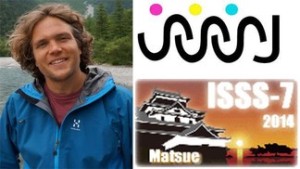Sep 3 2014
Hugo Dil has been awarded the Heinrich Rohrer Medal by the Surface Science Society of Japan.
 © 2014 Hugo Dil/EPFL
© 2014 Hugo Dil/EPFL
The Surface Science Society of Japan awards the Medal every year to three “researchers who have made the world-top level achievements in the fields of nanoscience and nanotechnology.” The Heinrich Rohrer Medal (HRM) is named after Swiss physicist Heinrich Rohrer (1933–2013) who won half of the 1986 Nobel Prize in Physics for the design of the scanning tunneling microscope.
Hugo Dil is the head of the Spin Orbit Interaction Spectroscopy (SOIS) lab at EPFL, where he holds an SNSF-funded professorship. He is being awarded the “Rising” HRM, which is given to promising researchers in the field below the age of 37. The Medal celebrates Hugo Dil’s “leading and creative roles in identifying novel spin structures using synchrotron radiation-based spin- and angle-resolved photoemission spectroscopy" (SARPES).
Hugo Dil is being recognized for demonstrating that “the asymmetric distribution of the wave function around a heavy atom core on a material surface is important for determining the Rashba-type spin splitting in surface states”, and for using SARPES to explore the spin texture in surface states of topological insulators, the nature of topological surface states and of topological transition, and the ‘spin interference’ phenomenon.
The award ceremony will take place at the 7th International Symposium on Surface Science (2-6 November 2014). As an HRM laureate, Hugo Dil will also be delivering a lecture on his research.
Author: Nik Papageorgiou
Source: SB | Sciences de Base